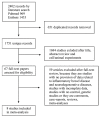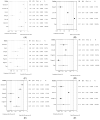The Risk of Developing Alzheimer's Disease and Parkinson's Disease in Patients with Inflammatory Bowel Disease: A Meta-Analysis
- PMID: 35806985
- PMCID: PMC9267426
- DOI: 10.3390/jcm11133704
The Risk of Developing Alzheimer's Disease and Parkinson's Disease in Patients with Inflammatory Bowel Disease: A Meta-Analysis
Abstract
Recently, a growing body of research has linked gut microbiota dysbiosis to central nervous system diseases, such as Alzheimer’s disease (AD) and Parkinson’s disease (PD), and has suggested that AD and PD pathology may take its origin from chronic inflammation in the gastrointestinal tract. Thus, this study aimed to elucidate whether inflammatory bowel disease (IBD) is associated with a higher risk of developing AD and PD as compared to the non-IBD population by conducting a meta-analysis. A thorough search of Pubmed and Embase databases was performed to identify all relevant articles. The quality of included studies was assessed using the Newcastle-Ottawa Scale. The odds ratios (ORs) with 95% confidence intervals (CIs) were analyzed using a fixed-effect model. To assess publication bias and heterogeneity among the studies, Egger’s test and L’Abbé plots were used, respectively. A total of eight eligible studies were included in this meta-analysis. No significant heterogeneity or significant publication bias was detected. The risk of developing AD in IBD patients was higher than in non-IBD patients (OR = 0.37; 95% CI = 0.14−1.00; p = 0.05), and there was a relationship between the occurrence of AD and Crohn’s disease or ulcerative colitis (OR = 0.11; 95% CI = 0.04−0.30; p < 0.0001, OR = 0.14; 95% CI = 0.04−0.49; p = 0.0024, respectively). The risk of developing both of the most common neurodegenerative diseases, AD and PD, was also significantly higher in patients diagnosed with Crohn’s disease or ulcerative colitis (OR = 0.21; 95% CI = 0.09−0.49; p = 0.0003, OR = 0.25; 95% CI = 0.13−0.51; p = 0.0001, respectively). This meta-analysis revealed a higher risk of AD and PD among CD and UC patients compared to the general population. It may suggest a key role for the gut microbiota in the pathogenesis of not only Crohn’s disease and ulcerative colitis but also AD and PD. The identification of this potential risk may provide earlier preventive measures to be implemented to reduce comorbidity and mortality rate.
Keywords: Alzheimer’s disease; Parkinson’s disease; gut-brain axis; inflammatory bowel disease; meta-analysis; neurodegenerative disease.
Conflict of interest statement
The authors declare no conflict of interest.
Figures




References
-
- Góralska K., Dzikowiec M. Role of microbiota in maintaining the homeostasis in the human body. Post. Mikrobiol. 2018;57:5–11. doi: 10.21307/PM-2018.57.1.005. - DOI
LinkOut - more resources
Full Text Sources

